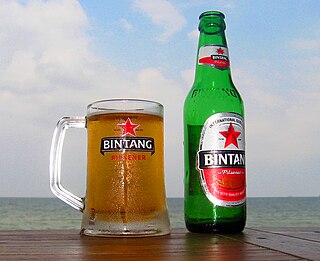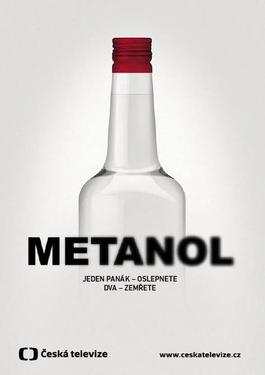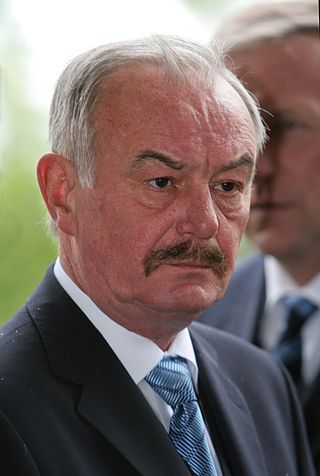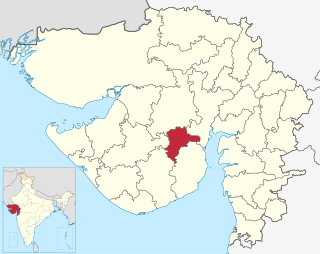
Prohibition is the act or practice of forbidding something by law; more particularly the term refers to the banning of the manufacture, storage, transportation, sale, possession, and consumption of alcoholic beverages. The word is also used to refer to a period of time during which such bans are enforced.

Moonshine is high-proof liquor, traditionally made or distributed illegally. The name was derived from a tradition of distilling the alcohol at night to avoid detection. In the first decades of the 21st century, commercial distilleries have adopted the term for its outlaw cachet and have begun producing their own legal "moonshine", including many novelty flavored varieties, that are said to continue the tradition by using a similar method and/or locale of production.

Miroslav Kalousek is a Czech politician, former leader of KDU-ČSL and TOP 09, and a member of the Chamber of Deputies (MP) from 1998 until his resignation in 2021. He served twice as Finance Minister in the cabinets of Mirek Topolánek and then again from 2010 to 2013 in the government of Petr Nečas.

Jiří Paroubek is a Czech politician, who was the prime minister of the Czech Republic from April 2005 to September 2006. He was also the leader of the Czech Social Democratic Party from 2006 until his resignation following the 2010 legislative election.

Ewa Chobot is a Polish-Czech pop-rock singer. She released five Polish-language and four Czech-language studio albums, and received platinum and gold certifications for them, both in Poland and the Czech Republic. She was a judge on the Česko Slovenská SuperStar in 2013, the Polish X Factor in 2014, and the Polish Idol in 2017.

Petr Nečas is a Czech former politician who served as the prime minister of the Czech Republic and leader of the Civic Democratic Party from 2010 to 2013, and as Member of the Chamber of Deputies (MP) from 1993 to 2013.
The Gujarat alcohol poisonings occurred in July 2009 in Gujarat, resulting in the death of 136 people from consumption of bootleg liquor.
The Sangrampur methanol poisonings occurred when a methanol-tainted batch of illegal alcohol killed 143 people at Sangrampur village in Magrahat I CD Block of Diamond Harbour subdivision in December 2011, affecting mainly manual workers of South 24 Parganas district in the Indian state of West Bengal.

Presidential elections were held in the Czech Republic in January 2018. The first round took place on 12 and 13 January. As no candidate won a majority, a run-off election between the top two candidates, Jiří Drahoš and President Miloš Zeman, was held on 26 and 27 January 2018.

Alcohol in Indonesia refers to the alcohol industry, alcohol consumption and laws related to alcohol in the South East Asian country of Indonesia. Indonesia is a Muslim majority country, yet it is also a pluralist, democratic and secular nation. These social and demographic conditions led to Islamic parties and pressure groups pushing the government to restrict alcohol consumption and trade, while the government carefully considers the rights of non-Muslims and consenting adults to consume alcohol, and estimates the possible alcohol ban effects on Indonesian tourism and the economy.

Presidential elections were held in the Czech Republic in January 2023, resulting in the election of Petr Pavel. Incumbent president Miloš Zeman was not eligible to run due to the two-term limit.

Metanol is a 2018 Czech movie. The movie is divided into 2 parts. The film focuses on the 2012 Czech Republic methanol poisonings. The first part premiered on 22 April 2018. It was viewed by 1,350,000 people. The second part premiered on 29 April 2018. It was viewed by 1,225,000 people. The film was viewed by another 500,000 people on Česká televize internet portal.

Election of the President of the Senate of the Czech Republic was held on 26 November 2008. Přemysl Sobotka wa reelected for his third term.
The 2020 Punjab alcohol poisoning was an incident in late July and early August 2020, where at least 100 people died after drinking illegally-made toxic alcohol in Punjab, India. Hundreds of raids were conducted in the three affected districts - Amritsar, Gurdaspur and Tarn Taran - along with several other places in and around the Rajpura and Shambhu border in Punjab. Forty people were arrested in relation to the incident. Seven excise officials, six policemen were also suspended over the incident.

On 25 July 2022, at least 42 people died and more than 97 were hospitalized in a methanol poisoning incident in Gujarat, India. The victims had consumed undiluted methyl alcohol (methanol), assuming it to be alcohol. The spurious liquor was then sold to more than 100 people in the villages of Ahmedabad, Botad and Surendranagar.

Martin Finger is a Czech actor.

The Consequences of Prohibition did not just include effects on people's drinking habits but also on the worldwide economy, the people's trust of the government, and the public health system. Alcohol, from the rise of the temperance movement to modern day restrictions around the world, has long been a source of turmoil. When alcoholic beverages were first banned under the Volstead Act in 1919, the United States government had little idea of the severity of the consequences. It was first thought that a ban on alcohol would increase the moral character of society, but a ban on alcohol had vast unintended consequences.















